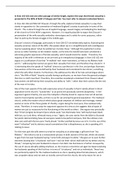In lines 142-162 and one other passage of similar length, explore the ways that female sexuality is
presented in The Wife of Bath's Prologue and Tale. You must refer to relevant contextual factors.
In lines 142-162 and 504-527 Chaucer, through the wife, explores female sexuality in a way that
stands in opposition to the convention of medieval England’s society in particular in terms of the
Church. This is done through the use of explicit language, sexual imagery and adopting the teachings
of the church to fit the Wife’s argument. However ,it is equally plausible to argue that Chaucer’s
presentation of the wife sexuality embodies stereotypes and is solely for comic purposes, rather
than to portray the female struggle in the middle ages.
Chaucer’s choices of language, particularly in lines 504-527 are deliberately explicit, illustrating the
sexually voracious nature of the Wife. She speaks about sex in a straightforward and unambiguous
manner speaking about “whan he wollde han my bele chose.” Although this euphemism comes
across as rather harmless to the modern reader, at the time this would have been considered a
extremely graphic expression of female sexuality, which would shock the reader. Therefore, the
majority of the wife’s references to sex are tied up in metaphorical language. In lines 142-162 she
argues in a justification of sex that “in wyfhod I wol mym instrement, as frely as my Makere hath
sent it, ” addressing that women are given their sexuality from God, and therefore they should it. It
is interesting that she speaks of “wyfhod” almost as a profession in this line, and perhaps illustrates
how women at the time were defined by their husbands and considered to be inferior, something
which the wife often distorts. Furthermore, this addresses the title of her tale and prologue where
she is “the Wife of Bath,” despite actually having a profession, as we learn from the general prologue
that she is a cloth merchant. Therefore, this could be considered a statement from Chaucer about
how women are defined by their sexuality and ability to “wife,” rather than their actions like the rest
of the men in his tales.
One of the main aspects of the wife expressive sense of sexuality is that it stands almost in direct
opposition to the church’s “autctoritee,” as at points she practically commits blasphemy. In her
argument against chastity, she uses the metaphor of barley bread to express how not all women
need to treat virginity sacredly, as there is use for sex among the general population. The medieval
church, unlike the modern church which places great emphasis of children and marriage, viewed
women in terms of the three grades of chastity; virgins being the most pure, then widows lastly
wives. Therefore, in many ways her argument opposes this view as she suggests that all types of
women are just as necessary for the functioning of the world as others. She argues very practically
that “lt hem (virgins) be bread of pure whete-seed,” but illuminates how “with barly bread, Mark
telle kan, our Lord Jhesu refressed many a man.” Again, she uses stories from the bible to illustrate
her points demonstrating how not everyone needs to be perfect and pure, that the ordinary man
does very well with the less pure “barly-bread,” further justified by Jesus use of it. It is the use of the
word “refreshed” and its obvious sexual connotations that is blasphemous as she is speaking of it
relating to Jesus.
For the most part the wife seems to treat her sexuality as an advantage, a gift sent from “my
Makere.” She refers to sex as a transactional process in both sections of the text, which she stands
to gain from her past husbands having “come forth and paye his dette.” She goes on to even further
extremes bosting that “a husbond I wol have- I wol not lette -which shall both be my dettor and my
thrawl,” comparing her past husbands to slaves in her debt. Her dominance is further conveyed by
the use of cesura abruptly adding emphasis, as she reverses convention yet again be depersonalising
her husbands speaking of the first four in terms of “a husbond,” and not as individuals. These lines
are particularly explicit for the medieval audience as she is speaking about female pleasure, which
was unspoken about and not seen as morally correct from the church, the only reason for sex in





